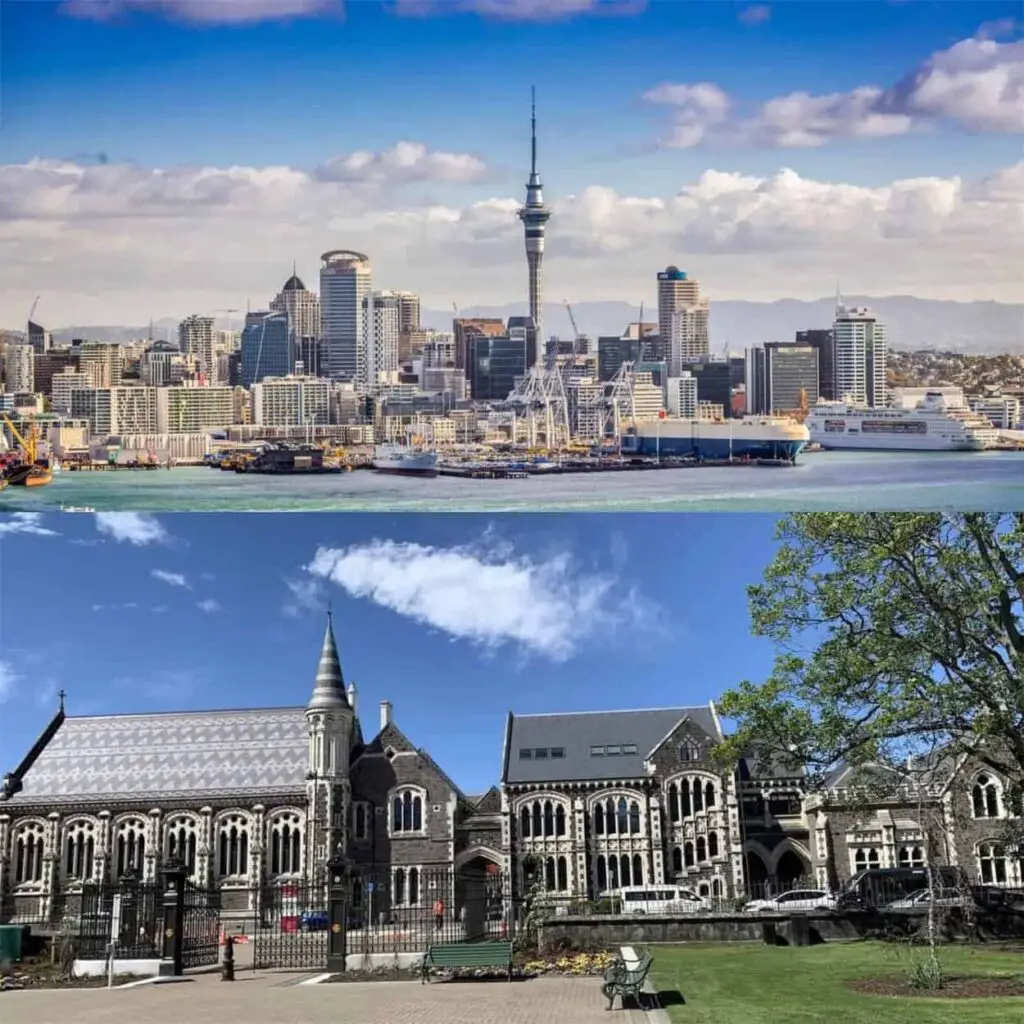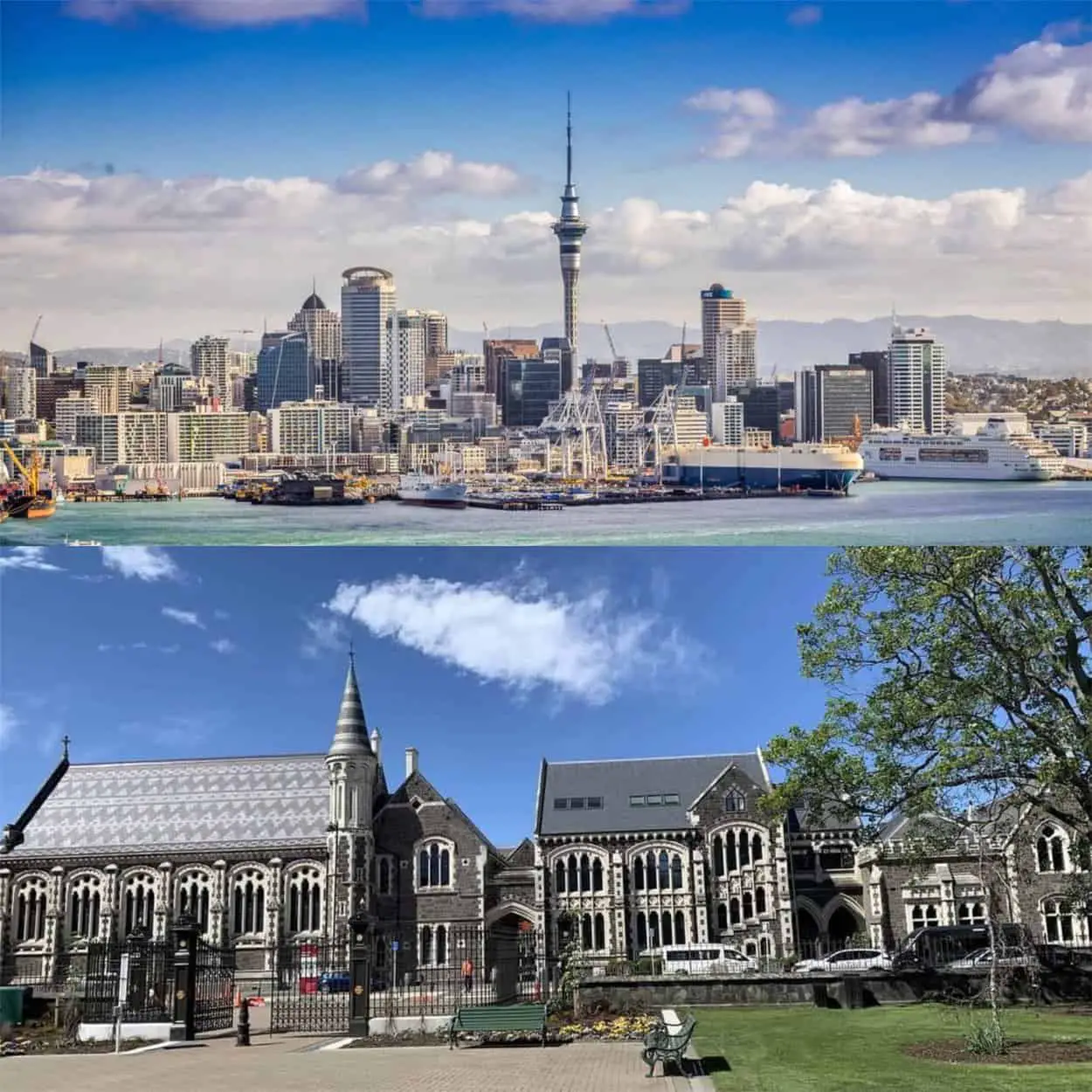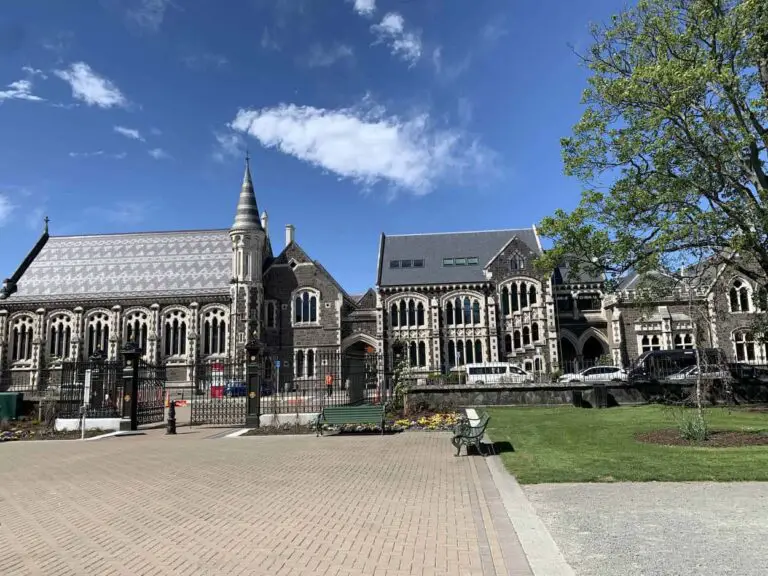Auckland vs Christchurch: Which City Is Better?

Auckland is New Zealand’s largest city (by far) but is only the 314th largest city in the world—narrowly beaten by Tirupur, India. With an urban population of just over 396,200, Christchurch is a distant second to Auckland’s 1,700,000 people but is still New Zealand’s second-most populous city.
Are there many differences between living in New Zealand’s two largest cities? Definitely. Both have a distinctive character shaped by their populations, surrounding landscapes and, in Christchurch’s case – earthquakes. Christchurch offers a more gentle pace of life (despite the earthquakes).
So where to put down roots? It’s time to uncover what makes both Auckland and Christchurch worthwhile places. But which city is actually better for you and your family?
Auckland or Christchurch – which is better for living?
Here is our rating of Auckland and Christchurch
Auckland’s size gives it most of what you would associate with a city – tall buildings, crowds, and general hustle and bustle.
Christchurch is smaller, feels more open-plan, and has less urban sprawl. There’s also a significant difference in the cost of living, with Christchurch offering better value for money. However, before you start packing your bags – a little more comparison might help.
Pros of living in Auckland
Auckland is incredibly multicultural, with some 40% of the city’s residents born overseas. This has led to some amazing international cuisine on offer in the city. Try eating your way along Dominion Road—with the area around Balmoral town centre described as the “United Nations of restaurants.”
You’ll struggle to find a city anywhere else in the world with as many stunning beaches as Auckland. It’s estimated that some 80 swimming beaches are located within Auckland’s city limits. Start with two of the better-known beaches – Piha and Orewa.
Maybe you don’t want to swim in the ocean but sail upon it? Auckland has the highest per capita level of boat ownership in the world, and it’s an exceptional place to get out on the water.
New Zealand’s economic performance has been a bit up and down, but its labour market remains relatively strong. Given the fact that Auckland’s population dwarfs anywhere else in the country, it’s clearly the place with the most diversity in employment options, unlike other centres in New Zealand, where you may struggle to find something outside of a key industry, like agriculture.
Although we pointed out that Auckland isn’t a huge city in the global sense, it’s still the big smoke as far as New Zealand is concerned. So, if you can’t live without the buzz of city life, then Auckland offers a definitive pro!
Pros of living in Christchurch
Christchurch is a small, manageable city. Downtown Christchurch has no hills and barely any inclines. It’s New Zealand’s second most walkable city (after Wellington).
The landscape around Christchurch is dramatic and beautiful. The city sits on the flat Canterbury plains, nestled between the breathtaking Southern Alps and the Pacific Ocean. That means you can be in the mountains just within 1,5 hr drive. Christchurch also has plenty of beautiful and most importantly empty beaches like one in Sumner.
Furthermore, the South Island’s largest city is far more affordable than its North Island cousins. The overall cost of living in Auckland is 22.7% higher than in Christchurch. Wellington is over 24% more expensive than Christchurch.
There’s a lot of newer housing stock in Christchurch’s central city, meaning you have more options when flatting or buying an apartment. The area underwent extensive rebuilding after the 2011 earthquakes.
There are clearly defined seasons. Summer is hot, and winter is cold. This differs from Auckland, where you might get all 4 seasons in a single day… or in a single hour.
Cons of living in Auckland
Auckland’s geography is stunning but potentially inconvenient. Much of Auckland’s urban area is on a narrow stretch of land between the city’s two harbours. This long and narrow layout can be incredibly frustrating if you live at one end of the city and have to work at the other end. Get ready for a long commute.
A long commute is common in Auckland, as are traffic jams. The city seems to have more cars than its streets can accommodate, and the morning and afternoon rush hours seem to be getting longer by the day. And unless you live close to one of the few suburban train lines, public transport isn’t going to be any easier.
New Zealand has a relatively low crime rate when compared to other countries, but crime rates are climbing – especially in Auckland since the pandemic. Crime rates increased by 20.3% in just over a year. Worryingly, many of these crimes are violent in nature.
Auckland’s growth has restarted again since the pandemic wound down. An average of 47,000 people relocate to the city each year. As such, there’s an aggravating amount of competition for real estate.
Cons of living in Christchurch
Christchurch is often described as cliquey. People hang around with the same friends they’ve had since they were kids, and it can be challenging for a new arrival. Socialising with co-workers from your new job is a good entry point, as are amateur sporting groups.
It’s not the most vibrant city, especially if you’re into nightlife. You will find that your nights end pretty early in Christchurch, and the CBD can feel like a ghost town on some evenings.
The Christchurch City Council sure seems to love building shopping malls. They dominate the outer suburbs and have arguably robbed many outer districts of their former character.
Earthquakes are fairly regular occurrences, although most are undetectable. However, when a big quake strikes the city, it can be devastating. Christchurch has its very own seismic faultline that runs beneath the city – named the Christchurch fault.
1. Quality of life
There are some downsides to life in New Zealand, but the country generally enjoys a high quality of life, evenly spread between both the urban and rural populations. A study by the Organisation for Economic Cooperation and Development (OECD) asked Kiwis to rate their quality of life out of 10. New Zealanders gave an average answer of 7.3, which is higher than the global average (6.7).
Both cities experience crime, but it’s lower when examined alongside comparably-sized cities. Auckland and Christchurch are experiencing overall increases in crime, and drug-related crimes are on the rise in Auckland. Otherwise, both cities score ratings of low or moderate in crime comparison indices.
Much of New Zealand’s transport infrastructure was sold off (privatised) in the 1980s, and public transport hasn’t really recovered. Christchurch has extensive, well-connected public transport (almost exclusively handled by buses). Auckland, on the other hand, doesn’t.
2. Cost of living in Christchurch vs Auckland
Auckland is estimated to have the 65th highest cost of living of any city in the world. Christchurch comes in at 151st place, so the difference between the cost of living in each place is noteworthy.
Including rent, Christchurch’s consumer prices are 18.5% lower than Auckland’s. You can also expect your groceries to cost about 9.5% less in Christchurch.
3. House prices
Auckland’s real estate prices have climbed so high they’re practically in orbit. Want to buy a house? The median price is north of a million (NZ$1,040,000, to be precise). Christchurch has largely escaped these excesses, with a median price of NZ$741,178.
As mentioned, Christchurch has newer housing stock in the CBD, and a small downtown flat is more affordable than a detached home in the suburbs. Finding a decent house in Auckland can be irritating, and those needing a larger family home might want to start looking in West Auckland, which is more affordable than the rest of the city.
4. Family life
Auckland was recently voted one of the best cities in the world to raise a family. Christchurch didn’t even make the list, but many of the benefits of Auckland also apply to Christchurch.
Essentially, parents were polled on a sense of safety and well-being, education opportunities, family activities, and cost of living. Although Auckland is more expensive to raise a child, there are more subsequent opportunities for your child.
Auckland polls higher than Christchurch due to its size. It has more activities and more open spaces, so it’s statistically superior in many ways. However, Christchurch’s lower cost of living and comparably low crime rate means you may feel it’s the better option when choosing a place for your kids to grow up.
5. Job opportunities
Auckland’s size means its job market has the most diversity in all of New Zealand. Christchurch’s own economy is quite agricultural. Dairy farming is widespread in the surrounding Canterbury plains, and a lot of barley and other grains are grown locally.
Healthcare workers and construction workers are in demand in both cities, but IT workers are more likely to find employment in Auckland. Christchurch has a robust tourism industry, so there’s a high proportion of hospitality work on offer—more than you might expect from a small city.
6. Salaries
The average salary in Auckland is NZ$71,960 per year. In Christchurch, it’s NZ$77,656 per year. This can directly translate to a higher quality of life for Christchurch residents compared to their Auckland mates: you earn more, and your expenses are lower.
Information and communication technology workers can generally command higher salaries, although the construction sector has seen the biggest salary increases—and increased demand, too, especially in Christchurch’s post-earthquake rebuilding.
Retail and hospitality salaries are at the lower end of the scale. A retail worker in New Zealand can expect to earn around NZ$45,825. There’s not much difference in what you would receive for unskilled labour across the country, since NZ has a minimum wage.
7. Weather and climate
Auckland’s weather can be volatile, although a run of hot, sunny days is pretty standard in the summer months. There’s also noticeable humidity in summer. Winters are rainy, to put it bluntly. Christchurch’s weather is more season-appropriate, and light snow isn’t out of the question in winter.
Even though Christchurch is more southerly, it’s about as warm as Auckland, with more hours of sunshine per year (2,141 annual hours vs Auckland’s 2,003 annual hours). Auckland beats Christchurch for beaches and boating, but Christchurch beats Auckland for hiking and skiing. It really depends on what lifestyle speaks to you.
8. Lifestyle
And speaking about the lifestyle of each city—it’s time for some (mostly) friendly rivalry. Pitting towns and cities against each other is a national pastime, and there have been some passionate comparisons between Christchurch and Auckland.
Auckland is quickly becoming a victim of its own popularity, and its infrastructure is struggling to cope with the number of people who want to live here. If you live and work in the same part of Auckland, you can enjoy a relatively stress-free life. But for a charming, inexpensive, and workable place with a more relaxed outlook on life, it might be that Christchurch is the better city.



![Can You Move To New Zealand Without a Job Offer? [2024]](https://simplenewzealand.com/wp-content/uploads/2022/12/pexels-pascal-renet-1089303-768x512.jpg)


![Best Cities For Job Opportunities in New Zealand [2024]: Attention Job Seekers](https://simplenewzealand.com/wp-content/uploads/2023/02/casey-schackow-h8wTmJU4XyU-unsplash-768x512.jpg)
